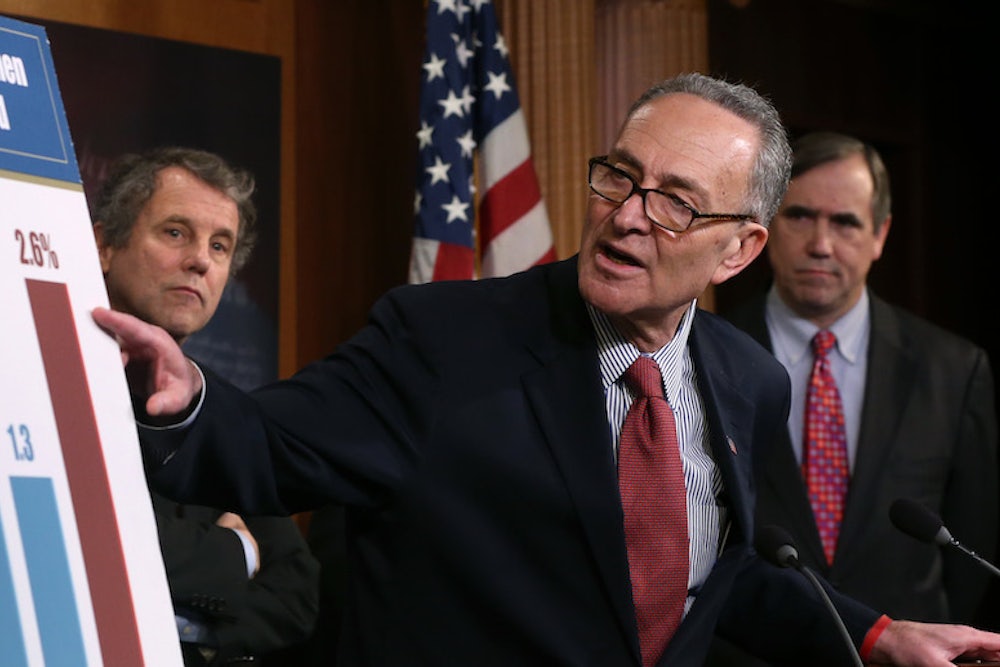If you’re among the millions of Americans who just lost or are about to lose extended unemployment benefits, you got some good news on Tuesday. A proposal to restore those benefits passed an important procedural hurdle in the Senate, when 60 senators voted to begin debate on it. The vote was a surprise: While President Obama and Senate Democrats have been calling to renew the extension, Republicans have resisted. Most observers and even many insiders figured the proposal might get four or five Republican votes, but fall short of the six it needed to hit the 60-vote threshold.
But the proposal, from Senators Dean Heller (R-Nevada) and Jack Reed (D-Rhode Island), can’t pass the Senate unless another 60-vote majority agrees to end debate. It can’t become law without getting through the House, which Republicans control outright. And those things won't be easy. The Republicans who voted for the measure on Tuesday say they won’t allow debate unless the proposal has offsetting budget cuts or revenue. House Republican leaders have said the same thing. It remains to be seen whether they mean it—and, more importantly, what kinds of offsets they’d be willing to consider.
To review: “Emergency Unemployment Compensation,” as it’s officialy called, is a standard response to hard times. It offers extra weeks of unemployment benefits, at the federal government’s expense, when jobs are particularly hard to find. The current extension dates back to 2008, when the Great Recession first began. That means it has lasted longer than the extensions in the last three recessions. But job growth has also been more sluggish in this recession. Previously, the federal government ended the extension when long-term unemployment was well below 2 percent. Right now it’s well above 2 percent. The graph below, from the Center on Budget and Policy Priorities, shows the difference nicely.
Until recently, Republicans opposed renewing the extension primarily because they said it was bad policy. Renewing benefits, they said, would discourage people from seeking jobs. (Never mind that the ratio of job-seekers to available jobs is still extraordinarily high and that you can’t claim benefits unless you are actually looking for work.) But very recently there’s been a shift in Republican rhetoric, as Greg Sargent noted this morning: Even some Republican leaders say they might be willing to back an extension, just as long as Congress finds some way to pay for it.
Paying for such extensions has not been a precondition for extending benefits in the past, on the very sound theory that temporary expansions of benefits don’t significantly affect the long-term fiscal picture—and that, if ever there’s a time to borrow money without offsets, it’s periods of economic hardship when deficits stimulate economic activity. The case for offsets would seem particularly weak now, since the deficit happens to be falling and falling fast. But offsetting the costs would still be better than not offsetting them at all—assuming it’s done in a smart way.
And that’s the catch. There’s a pretty simple, two-part test of any proposed method of paying for the extended benefits.
1) Who's paying the bill? The point of extended unemployment benefits is to help poor and middle-class Americans struggling to pay their bills. A proposal that paid for the extension by cutting food stamps or some other safety net program would be simply be shifting the pain from one group to another.
2) When is the bill being paid? Unemployment insurance is a terrific form of economic stimulus, because, according to most research, the people who get it spend it right away. But to get the maximum effect, you’d want the offsetting cuts or revenue to take place in the future.
Is that what the Republicans have in mind? Already there’s talk of paying for the benefits extension by taking money away from the Affordable Care Act, which would mean helping unemployed workers at the expense of people who need help paying for their health insurance. That’s obviously a non-starter. But Democrats have signaled they’ll discuss other ideas. If some Republicans feel the same way, people struggling to find jobs might yet get the help they need.
By the way, for more background on the unemployment program I highly recommend (as always) Brad Plumer's summary of the issue at Wonkblog.
